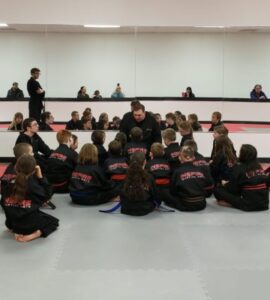This article was last updated on July 05, 2025

Inspire Martial arts training gives great, benefits for kids’ fitness, discipline, and confidence. Many parents sign up their kids: hoping for these things, right? But, what if the time it takes to learn, isn’t what they expect? This can make everyone feel stressed. Knowing what’s really possible, and how to back your kid’s journey, changes martial arts into a fun1 ride for kids, and mum and dad.
Why Do Kids Grow at Different Speeds?
Each kid moves at their own speed Because of:
- Body things: coordination, strength, and physical skills
- Mind stuff: focus span, thinking speed, and study style
- Feelings area: ease with challenges, staying tough, self-control
- People stuff: fitting into groups, dealing with new adults
Research from American Academy of Pediatrics say growth stages happen over a range, not on fixed timeline. One 6-year-old might get new moves quickly but one 8-year-old might need a lot more time: both normal happenings, right?
The Crucial Adjustment Period
Starting martial arts represents a major life transition:
- New environment with unfamiliar sights, sounds, and expectations
- New authority figures (instructors) and social dynamics
- New physical demands and cognitive challenges
According to Child Mind Institute, children need 4-8 weeks to fully acclimate to new structured activities. During this period, focus on attendance consistency rather than skill acquisition.
The Danger of Comparisons
Common comparison traps include:
- The “natural prodigy” who seems to learn instantly
- The “seasoned peer” with months more experience
- Siblings with different learning styles
A University of Chicago study found that comparison pressure reduces children’s motivation by up to 32%. Instead, track individual progress through:
- Instructor feedback
- Video snapshots monthly
- Small skill celebrations
Age-Appropriate Milestones
| Age Group | Realistic 3-Month Goals | Typical 12-Month Milestones |
| 4-6 yrs | Following instructions, basic stances, taking turns | Coordination improvement, basic blocks/kicks, confidence speaking up |
| 7-9 yrs | Consistent focus, combination movements, respect rituals | Controlled techniques, self-discipline application, leadership in drills |
| 10-13 yrs | Complex sequences, partner work, growth mindset | Advanced forms, teaching assistantship, emotional regulation |
Source: Journal of Sports Science & Medicine
How Quality Programs Accelerate Progress
The Inspire Martial Arts curriculum exemplifies best practices:
- Brain-based skill sequencing: Techniques introduced when neurologically appropriate
- Scaffolded challenges: Each skill builds on previous mastery
- Multi-domain development: Physical, cognitive, emotional and social growth integrated
Research from Harvard’s Center on the Developing Child confirms that this integrated approach creates 40% faster skill retention than traditional methods.
Parental Support That Actually Helps
- Focus on process over product
Praise effort (“You concentrated hard!”) over outcome (“Your kick was perfect!”) - Create a consistent routine
Regular class attendance matters more than extra practice - Become a curious observer
Ask: “What felt easier today than last week?” instead of “Did you earn a stripe?” - Manage your own expectations
Remember the 10,000-hour rule applies to children too
Psychology Today reports that children with process-focused parents show 3x greater long-term commitment to activities.
The Transformative Timeline
- Weeks 1-4: Survival mode – learning dojo etiquette and basic positions
- Months 2-3: Emerging competence – noticeable improvement in 1-2 skills
- Months 4-6: Confidence bloom – voluntary participation, asking questions
- Year 1: Skill integration – techniques become reflexive
As noted by the National Association for Sport and Physical Education, this gradual progression builds neural pathways more effectively than rushed training.
When Progress Seems Slow
Normal plateaus occur when:
- Growth spurts temporarily disrupt coordination
- Cognitive leaps prioritize mental development
- Emotional events (school changes, friendships) redirect focus
During these periods, Understood.org recommends emphasizing:
- The value of perseverance
- Non-martial arts benefits (better sleep, improved focus)
- Trust in the instructor’s expertise
The Lifetime Advantage
Beyond physical skills, martial arts cultivates:
- Resilience: Bouncing back from missed techniques
- Growth mindset: Viewing challenges as opportunities
- Embodied confidence: Physical competence creating mental fortitude
A 10-year UCLA study found martial arts participants had 25% higher college completion rates and significantly better stress management skills.
Inspire Martial Arts
📍 10139 Royalton Road, North Royalton, OH 44133
📞 (440) 877-9112
🌐 Discover Our Age-Specific Programs






